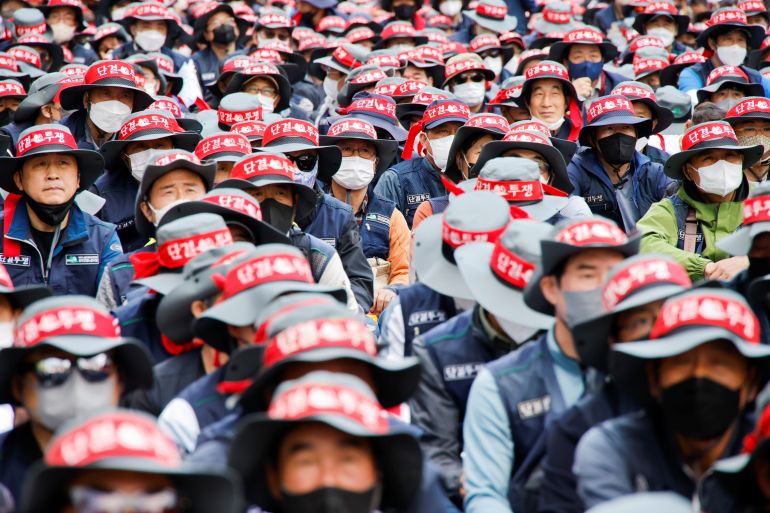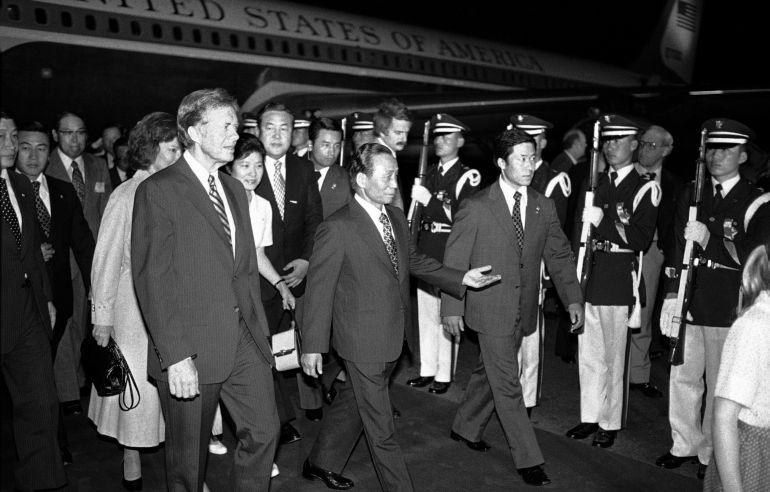South Korea’s Unions Cry ‘Red Scare’ Amid North Korea Spy Claims

South Korea's largest trade union has accused the government of suppressing the country's labour movement photo: Heo Ran
Seoul, South Korea – For the past six years, Kim Joo-hwan has worked as what in South Korea is known as a “substitute driver”.
He drives people home in their car when they cannot themselves because they have been drinking.
Using Kakao Mobility, a branch of one of South Korea’s biggest tech companies, customers can request a sober driver to meet them and safely take them and their car home, saving on the cost of parking overnight and the hassle of having to retrieve their car the next day.
Like a growing number of gig workers that rely on platform-based services such as Kakao, Kim has been involved in organising better working conditions and pay.
Last year, he helped establish a union to negotiate with Kakao management for better conditions, such as drivers being paid for the time they spend going to meet a client.
But now Kim feels he is watching his government, led by conservative President Yoon Suk-yeol, resort to an old tactic he remembers from his days as a young worker in the 1980s: tarring unionists as communists working on behalf of North Korea.
This month, South Korea’s spy agency raided the offices of the Korean Confederation of Trade Unions (KCTU), a leading left-wing umbrella group that represents workers across several industries, on allegations that union officials had illegal contact with North Korean agents.
Local media have reported that the National Intelligence Service (NIS) suspects that a number of KTCU officials met with North Korean spies in China, Cambodia and Vietnam.
The KCTU condemned the raids as an effort to suppress the labour movement, promising to “struggle against the violence of the Yoon Suk-yeol regime”.
“This current government is seeking to divide workers, to expand the differences between different kinds of workers,” Kim told Al Jazeera.
“They know that if workers come together, they can cause big losses for companies,” he added.
Under South Korean law, citizens are prohibited from contact with North Korean people or organisations unless they receive government permission.
The country’s controversial National Security Law bans a range of activities, including expressions of sympathy with or support for North Korea, which fought a bloody war with South Korea from 1950 to 1953. The conflict ended in a stalemate that remains unresolved to this day.
Critics have long argued that the law is vaguely worded and can be easily misused by South Korean prosecutors and intelligence agents to muzzle left-wing critics.
The military strongmen Park Chung-hee and Chun Doo-hwan, who ruled South Korea during the rapid industrialisation of the 1970s and 1980s, routinely cited the threat from North Korea as a pretext to suspend civil and political rights.

South Korean former President Park Chung-hee (centre) cited the threat from North Korea to suspend civil and political rights: AP
More recently, conservative presidents, including Lee Myung-bak and Park Geun-hye, who ruled from 2008 to 2017, employed similar rhetoric to curtail speech and activism deemed pro-North Korean.
Yoon, a former chief prosecutor who had no political experience before entering office last May, has accused the labour movement of being a hotbed of corruption, singling out unions as one of three sources of “evil” holding back the country’s development.
To workers like Kim, the recent raids by the NIS, whose director is appointed by the president, feel like the latest iteration of a well-worn tactic.
“Even if there were individual members who actually had contact or relationships with the North Korean government, treating the entire union as an espionage organisation should be avoided,” Park Kyung-sin, a law professor at Korea University, told Al Jazeera.
“So far, some right-wing politicians are doing that and I hope that it does not actually affect the work of the Yoon administration,” Park said.
South Korea’s labour movement has long been known for the distinctly left-wing tenor of its activism.
Large organisations such as the KCTU and the Korea Metal Workers’ Union often hold rallies espousing customarily left-wing causes, including opposition to joint military exercises by South Korea and the United States, which fought against North Korea in the Korean War.
The unions object to the exercises on the grounds they serve only to antagonise North Korea and can increase the risk of a war breaking out on the Korean Peninsula, while arguing that South Korea should instead be seeking dialogue with Pyongyang.
In 2012, the KCTU voted to end its affiliation with the Unified Progressive Party (UPP), a minor left-wing party, amid controversy over the pro-North Korea views of some of its members.
Critics of the KCTU argue that, as a union, it should concern itself only with workplace matters, such as wage negotiations and advocating for workers who have grievances with their employers.
South Korea’s pro-business media have also called union members selfish for carrying out collective actions over the past year, at a time when the country has been struggling to reboot a sluggish economy after the shock of the COVID-19 pandemic.
“At a time of economic crisis, instead of sharing hardship, unions are carrying out an extreme struggle to fulfil members’ demands,” the right-leaning Donga Ilbo newspaper said in a recent editorial.
Unions have argued that the Yoon administration is attempting to scapegoat them and draw attention away from its own mistakes. The KCTU pointed out that the raids on its offices came shortly after Yoon had caused controversy while on a visit to the United Arab Emirates.
During a meeting with South Korean soldiers stationed in the country, Yoon said the UAE has an “enemy” in Iran, which is analogous to South Korea’s antagonistic relationship with North Korea. Iran accused Yoon of interfering in Iran-UAE relations and summoned the South Korean ambassador in Tehran to protest Yoon’s off-the-cuff comment.
It was not Yoon’s first flub while on an official trip overseas. While in New York last year, Yoon was caught on camera appearing to use foul language to refer to US politicians after he had a brief encounter with President Joe Biden.
The South Korean presidential office denied that Yoon had used any profane language, claiming that a local broadcaster misreported his words.
Kim, the gig worker, is now working to organise workers to lobby politicians for changes in the country’s labour law that would require companies to recognise contract workers as employees, and prevent companies from holding workers legally responsible for losses incurred during strikes.
“Myself and other platform workers are saying that we can’t live under this system anymore,” Kim said. “We have no choice but to struggle for something better.”
